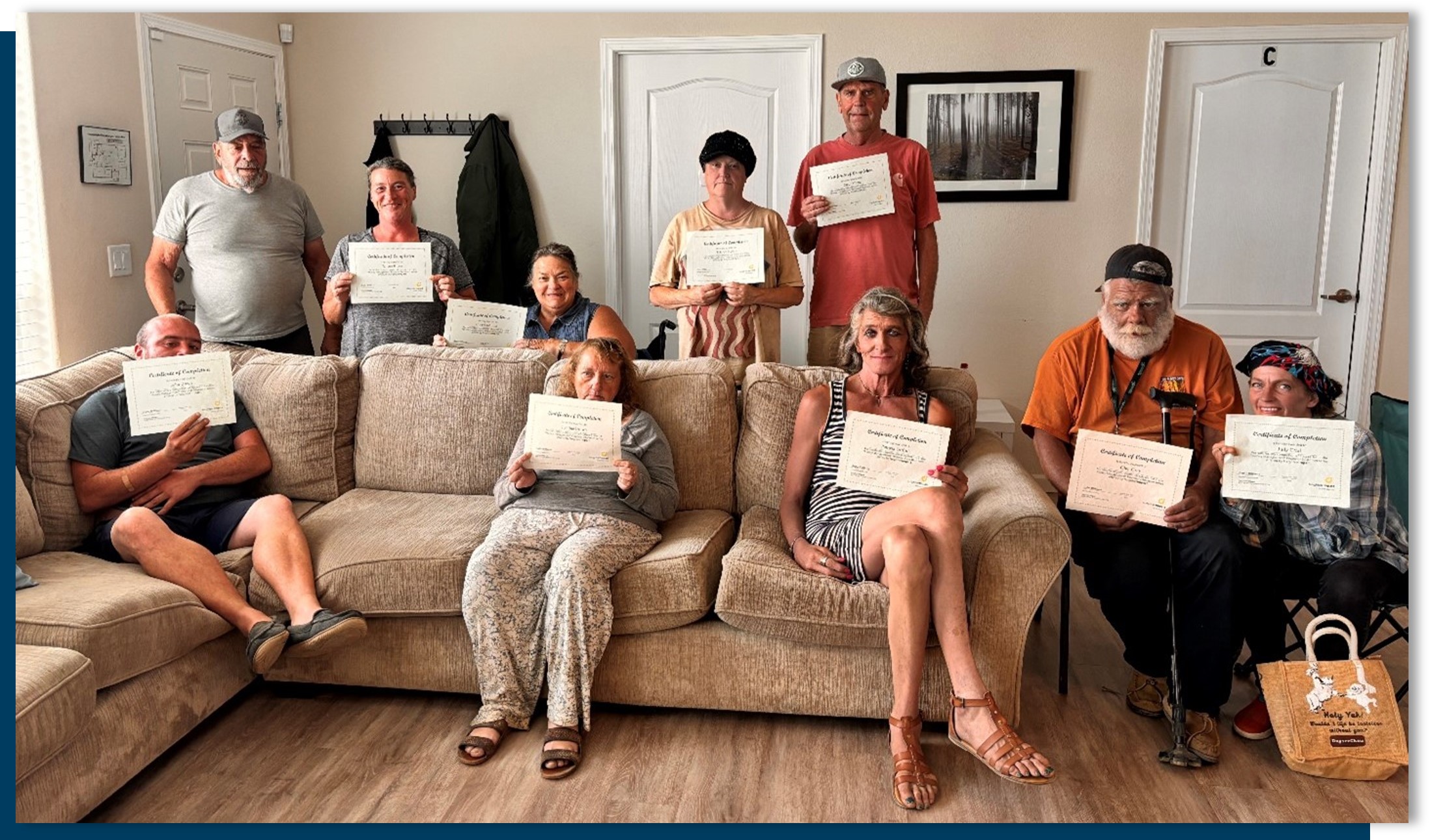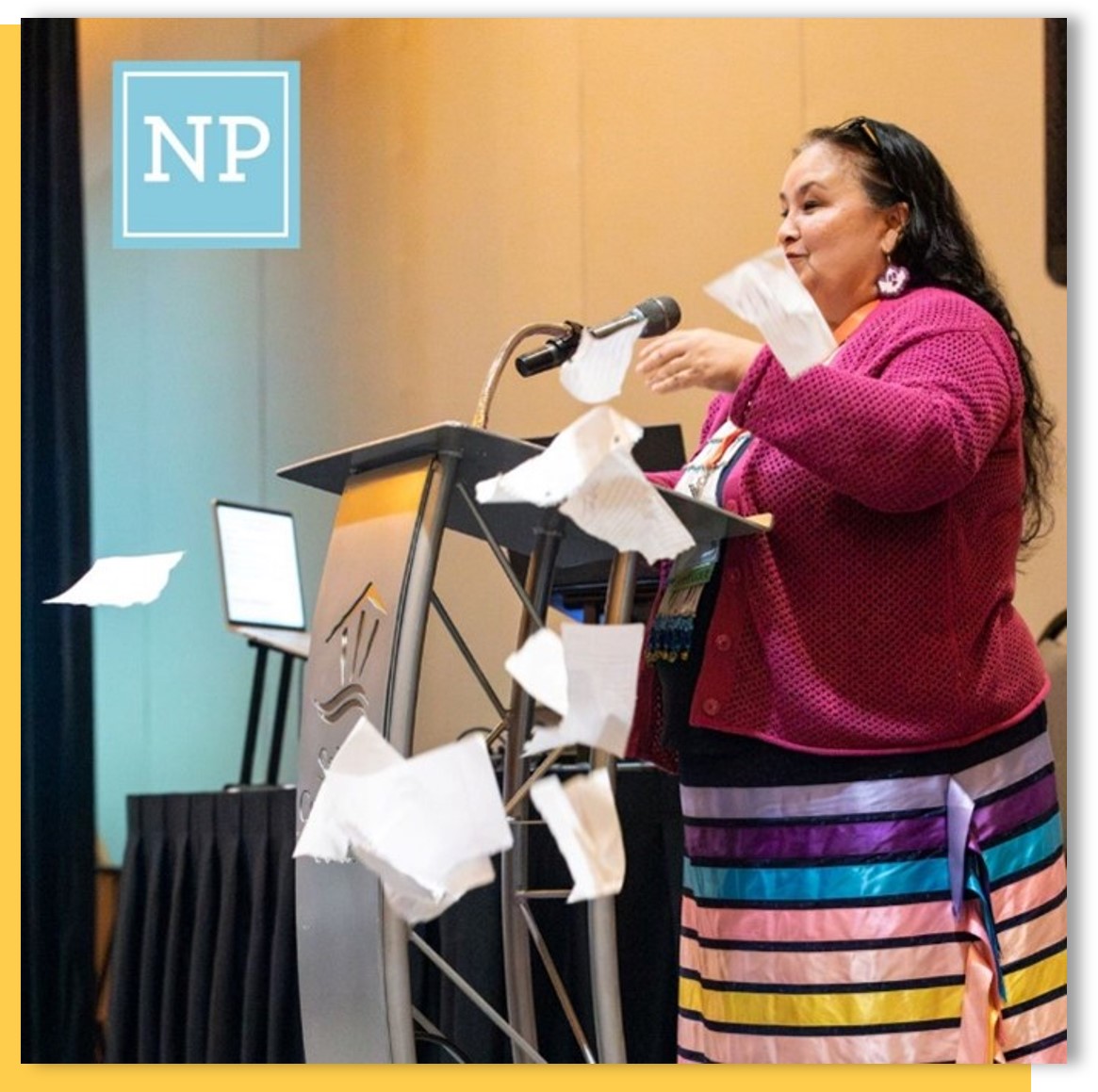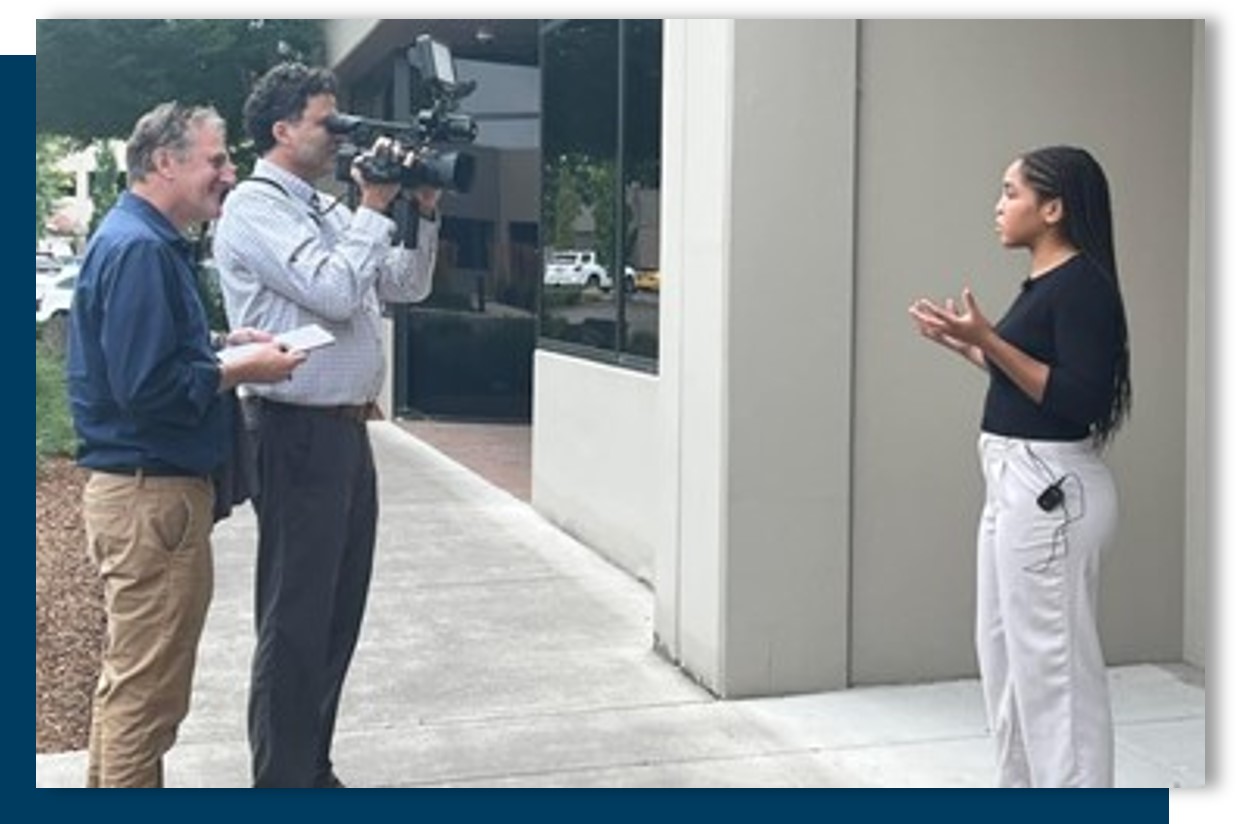Thank you for your interest in financial empowerment and financial wellness in Oregon. This quarterly newsletter highlights efforts statewide that are putting more Oregonians on the path to security, solvency, and success. Does your organization have news? Please let us know.
Helping the Formerly Homeless: Central Oregon Transitional Housing Residents Build Financial Security

As part of a new partnership with Central Oregon-based NeighborImpact, residents at Redmond’s Oasis Village receive financial lessons along with transitional housing.
Since Oasis Village opened in January in Redmond in Central Oregon, formerly houseless people have been able to stay safely in tiny cabins, transition to stable housing, and connect with case workers to receive healthcare services, apply for jobs, and get education resources.
Among that important learning: Financial education specifically tailored to the experiences and challenges often shared by those in transitional housing.
The lessons come courtesy of NeighborImpact , a Redmond-based nonprofit and the 2023 Oregon Financial Empowerment Community Champion awardee -- and the knowledge also goes beyond basic budgeting. A long-term partnership between the nonprofit and the transitional housing site recognizes the lasting importance of financial education and support for some of the community’s most vulnerable residents, leaders said.
Residents learn practical strategies for managing resources more effectively, such as using public benefits like food banks to stretch their income and directing funds toward other essential expenses. The program also covers how to manage a fixed income, and prioritize bills when income is limited—helping participants know which bills to pay first.
“Within financial literacy, there are a lot of barriers—credit, understanding what benefits are available and how to access them,” said Taylor Wilkinson, NeighborImpact’s financial education specialist and the teacher leading the workshops at Oasis Village. “We can help them understand how to overcome these barriers while moving into a more stable housing situation.”
Want $180? Refundable tax credits are incentives for education and disability saving
Oregon is investing in the financial wellbeing and the educational future of its community members, through a one-of-a-kind progressive tax benefit.
Savers who invest in the Oregon College Savings Plan, for higher education and job training costs, and also the Oregon ABLE Savings Plan, for costs associated with disabilities, can receive a refundable Oregon income tax credit of as much as $180 per taxpayer, per year.
However, just a small minority of Oregonians – less than 3 percent of taxpayers -- actually claimed the financial wellness-enhancing credits in 2022. A workgroup will outline potential strategies to improve uptake, during the Nov. 12 quarterly meeting of the Financial Empowerment Advisory Team.
The credit is structured to give low- and middle-income Oregonians a powerful incentive to save: People with incomes of $30,000 or less will receive back $1 for every $1 they save, up to $180.
Biennial Conference Highlights Statewide Collaboration and Economic Equity

Keynote speaker Jillene Joseph illustrated how indigenous people had lives torn apart by colonialism, (photo credit: Celina Flores)
Community advocates, political decisionmakers, and nonprofit workers convened in Salem on Oct 15-16 to discuss ways to enhance community engagement, economic justice and also financial stability in Oregon’s underserved populations.
The RE:Conference 2024 was presented by Portland-based Neighborhood Partnerships, which oversees the state’s Individual Development Account (IDA) network, allowing low- and middle-income people statewide to receive matched savings and financial education.
In a keynote address, Jillene Joseph, Executive Director of the Native Wellness Institute, challenged attendees to understand the long-term impact of racist policies and the urgency of working together for a better future.
The conference also highlighted community building and rebuilding efforts, such as the Albina Vision Trust in Portland and Coalición Fortaleza in Southern Oregon.
We continue to focus on how to best leverage the power of our networks and coalitions to achieve equity through racial, economic, and housing justice in our state,” said Neighborhood Partnership’s Organizational Director, Roberta Phillip-Robbins.
Teens launch FLY to the World to help their peers

Joelliane Iyasele discussed the nonprofit she co-founded, FLY to the WORLD, prior to the FEAT meeting on Aug. 15.
When it comes to learning money smarts, Beaverton teenage Joelliane Iyasele and three of her friends saw two glaring problems.
First, they didn’t have curriculum that got them engaged. And second, adults can be boring, and unconvincing.
So the quartet – who live across the country – launched their own youth-led financial education nonprofit, called FLY to the World (FLY stands for Financial Literacy of Youth) – with the goal of teens sharing financial education with teens.
“Our mission is to mission is to equip young people with the skills and awareness necessary to manage their resources and money responsibly,” Iyasele said. “And for a lot of youth, they are more likely to listen to each other.”
She began attending the University of Chicago this fall.
The nonprofit has offered clinics and classes in Oregon to the Tualatin Hills Park & Recreation District’s volunteer academy and Beaverton Black Parent Union Summer Academy.
State of Oregon Happenings
Guidance: Oregon districts have flexibility to teach financial education requirement over multiple years
Starting with the graduating class of 2027, Oregon students will need to earn a semester each of personal finance and lifeskills credits, thanks to new state law from 2023. The first students required to receive the instruction are now in their sophomore year of high school.
Oregon educators and districts now have a clearer picture for how students can learn important skills like budgeting and tax preparation, via detailed new implementation guidance published Oct. 22 by the Department of Education. Because Oregon is a local control state, districts have significant latitude how to implement the classes – as long as administrators ensure the standards are taught in dedicated class time as required by the Legislature and agency.
Among the new clarity:
Districts have flexibility who can teach the classes, including adjunct community members who successfully obtain Career and Technical Education (CTE) teaching licenses.
Students can receive the semester worth of personal finance credits in a single class or via work in separate classes, provided that time is dedicated, all the standards are adequately covered, and mastery is demonstrated.
tudents can earn the personal finance credit in eighth grade if they complete a high school PFE course, just like any other content area.
Before July 1, 2026, districts or public charter schools that they lack qualified educators may apply for a one-year waiver.
The coursework can simultaneously qualify for personal finance and also other credits if both sets of content standards are adequately covered.
The life skills and personal finance credits are part of the 24 credits required for graduation. To make room, the state is reducing the number of required electives students must complete.
Oregon ABLE Celebrates 10 Years of Helping People With Disabilities to Save
A decade ago, federal legislation gave Oregon the opportunity to offer people with disabilities something they’d never had: The chance to save for a better life, without jeopardizing their eligibility for vital benefits.
Fast forward to today, and almost 10,000 people are saving a combined $97 million through the Oregon ABLE Savings Plan. On Oct. 2 State Treasurer Tobias Read, savers, educators and disability advocates from across the state gathered to celebrate the milestone anniversary (LINK) – and also to discuss ways to connect more eligible Oregonians with the life-improving program.
“Beyond the numbers, Oregon ABLE Savings Plan represents something even more significant: It represents empowerment,” Treasurer Read said.
It is hard to live with a disability, and it can be extremely expensive. Yet before the advent of the Oregon ABLE plan, people with disabilities were forced to “spend down” their assets every month, because having more than$2,000 would render them ineligible for assistance programs like Social Security Disability payments.
Thanks to ABLE plans, eligible people can accumulate as much as $100,000 without interfering with their eligibility for benefits.
First-time Homebuyer Accounts Become More Accessible Starting in 2025
The state helps first-time homebuyers via a little-known savings account – and starting in January, it will be even easier to open one.
That’s when buyers will be able to start accounts at any financial institution, as opposed to just a handful. In addition, people will be able to open an account to help somebody else, like a relative.
First-Time Home Buyer Savings Accounts qualify buyers for tax credit of as much as $50,000 over a decade, and deposited funds can be used for costs such as down payments, insurance, commissions and other closing costs, according to the Department of Revenue.
For 2025, individual account holders filing a tax return may subtract up to $6,125 of their annual deposits and earnings from their Oregon income, or $12,245 for joint filers. To qualify, the account holder or beneficiary can't have owned or purchased a residence in the three years prior to the date of their planned purchase.
Oregon Financial Empowerment Roundup
Oregon Attorney General Ellen Rosenblum, the current president of the National Association of Attorneys General, hosted a conference in Portland on Sept. 5-6 titled “America’s Youth: AGs Looking Out for the Next Generation.” Topics for the conference included improving financial education and managing social media exposure.
Nonprofit CASH Oregon is seeking volunteer tax preparers for the 2024 tax season.
Oregon’s Division of Financial Regulation recovered more than $5.6 million in the first half of 2024 via compliance and consumer protection efforts.
The Oregon Department of Human Services is offering free help to seniors for Medicare Open Enrollment, which lasts until Dec. 7. (En Espanol)
The U.S. Consumer Financial Protection Bureau has compiled new and updated glossaries of financial words in eight languages: Arabic, Chinese, Haitian Creole, Korean, Russian, Spanish, Tagalog, and Vietnamese. The glossaries were created to serve as a translation tool for content creation that serves limited
Oregon Housing and Community Services’ Homeowner Assistance Fund, offering grants averaging $26,500 to eligible people impacted by the COVID pandemic, is accepting final applications online until Oct. 31.
Good news for taxpayers: Oregon will team with IRS to offer free income tax e-filing option.
The Federal Trade Commission has updated materials to help librarians help patrons spot, avoid and report scams.
The Better Business Bureau is warning about a new “Task Optimization” fake employment scam that has already cost victims as much as $10,000 each in 12 states including Oregon.
The National Guard is helping tools to improve the financial wellness of military families via the Department of Defense’s Office of Financial Readiness.
Nonprofit DevNW offers foreclosure avoidance counseling at offices in Lane, Marion, Clackamas and Linn/Benton counties.
Learn and earn free money for education: Take a lesson about money management, and receive $50 to open an Oregon College Savings Plan account, through a partnership with Oregon-based Financial Beginnings.
| Date |
Event |
Oct. 28 |
Can innovative technologies make green finance better?, 8:30 a.m., Oregon Division of Financial Regulation, Zoom |
Nov. 1 |
Deadline: Small Business Credit Survey, U.S. Federal Reserve, San Francisco |
Nov. 9 |
Your Money, Your Future Summit, 9 a.m., AARP Oregon, Smullin Health Education Center, Asante Rogue Regional Medical Center, Medford |
Nov. 12 |
Financial Empowerment Advisory Team, 2 p.m., Oregon State Treasury, Virtual meeting |
Nov. 13 |
Class: Extreme Couponing, 5:30 p.m., DevNW, Zoom |
Nov. 12-15 |
Veteran Saves Week, America Saves |
Nov. 16 |
Fundaciones Financieras (Spanish), 9 a.m., Dev NW, Zoom |
Nov. 20 |
Wills & Advanced Directives, 5:30 p.m., Dev NW, Zoom |